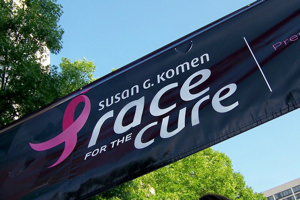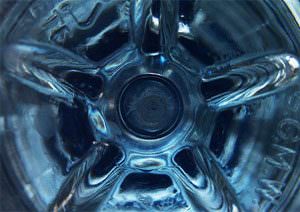Susan G. Komen and the BPA-Breast Cancer Link
In the face of mounting scientific evidence, Susan G. Komen for the Cure, a nonprofit devoted to wiping out breast cancer, has published statements on its website that dismiss links between the disease and the ubiquitous chemical bisphenol A (BPA), while simultaneously funding research exploring that connection. (more)
In the face of mounting scientific evidence, Susan G. Komen for the Cure, a nonprofit devoted to wiping out breast cancer, has published statements on its website that dismiss links between the disease and the ubiquitous chemical bisphenol A (BPA), while simultaneously funding research exploring that connection.
More than 100 studies connect BPA to breast cancer in humans, while others have established the link in lab animals. The Centers for Disease Control and Prevention estimated that BPA is in the bodies of more than 90 percent of the U.S. population. In April of last year, however, Komen deemed the chemical safe. Nevertheless, in 2011 the organization gave $450,000 to a researcher who hypothesizes that BPA “causes or accelerates breast cancer.”
Mother Jones:
The United States’ President’s Cancer Panel concluded in 2010 that “more than 130 studies have linked BPA to breast cancer, obesity, and other health problems.” A number of studies have found that the chemical causes breast cancer in lab animals. In human cell cultures, BPA has caused breast cancer cells to proliferate and has also reduced the effectiveness of chemotherapy. In September, a study by the California Pacific Medical Center found that BPA even made healthy breast cells behave like cancer cells and decreased the effectiveness of yet another breast cancer drug. Frighteningly, the Centers for Disease Control and Prevention says that BPA is in the urine of more than 90 percent of the United States population. Researchers believe this figure reflects continuous exposure to the chemical.
In April 2010 Komen posted an online statement saying that BPA had been “deemed safe.”
Furthermore, studies suggest that the majority of breast cancer incidences are caused by environmental factors, such as BPA. Yet research on those causes remains underfunded. –ARK
Your support matters…Only about 10 percent of cases of breast cancer in the United States can be traced to hereditary factors, research shows. “We now know from just a whole lot of science that environmental variables have a strong influence on gene expression,” said Dr. Ted Schettler, Science Director of the Science and Environmental Health Network.
Yet scientists, including the President’s Cancer Panel report released in 2010, say that research on the environment and cancer as a whole remains grossly underfunded. “There traditionally has been tremendous resistance to looking at environmental issues. And that’s because there are very powerful interest groups lobbying against doing that,” [University of Missouri biology professor and BPA expert Dr. Frederick] vom Saal said.
Independent journalism is under threat and overshadowed by heavily funded mainstream media.
You can help level the playing field. Become a member.
Your tax-deductible contribution keeps us digging beneath the headlines to give you thought-provoking, investigative reporting and analysis that unearths what's really happening- without compromise.
Give today to support our courageous, independent journalists.





You need to be a supporter to comment.
There are currently no responses to this article.
Be the first to respond.